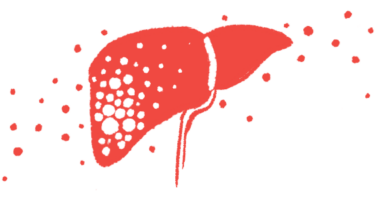FDA gives denifanstat for MASH breakthrough therapy status
Supports potential oral therapy that soon may move into a Phase 3 trial

The U.S. Food and Drug Administration (FDA) has given breakthrough therapy designation to denifanstat, Sagimet Biosciences’ investigational oral therapy for metabolic dysfunction-associated steatohepatitis (MASH), a severe form of fatty liver disease.
Its status is indicated specifically for the treatment of MASH patients with moderate to advanced liver scarring (fibrosis) and no cirrhosis, or irreversible fibrosis.
Breakthrough therapy designation aims to accelerate the development and regulatory review of experimental treatments with preliminary clinical evidence that supports their potential to be a substantial improvement over existing therapies for a serious disease.
It offers incentives such as more frequent communication with the FDA during the drug development process, as well as possible eligibility for priority review, which shortens the approval review process from 10 to six months.
Denifanstat works by blocking a fat-producing protein in the liver
“The FDA’s Breakthrough Therapy designation for denifanstat underscores the global incidence of MASH and the continuing need for new therapies,” David Happel, CEO of Sagimet, said in a company press release.
Data from the Phase 2b FASCINATE-2 clinical trial (NCT04906421) supported the FDA decision. Sagimet reported that the oral therapy was superior to a placebo at resolving MASH without worsening fibrosis in patients with moderate to severe liver fibrosis.
The company also plans to launch a Phase 3 clinical trial of denifanstat in MASH patients by year’s end.
MASH, formerly called nonalcoholic steatohepatitis or NASH, is a serious form of metabolic dysfunction-associated steatotic liver disease.
The disease initially was known as nonalcoholic fatty liver disease, because MASH patients experience an abnormal buildup of fat in the liver that leads to inflammation. This underlying inflammation can cause damaging liver fibrosis, which in severe cases can progress to the cirrhosis that risks liver failure.
Until recently, MASH had no approved treatments, and disease management focused on lifestyle changes designed to promote weight loss. Rezdiffra (resmetirom) was approved in the U.S. in March to treat adults with MASH, used in combination with diet and exercise. A similar approval application is under review by European Union regulators.
Denifanstat works by blocking, or inhibiting, the activity of fatty acid synthase (FASN), a protein that makes fat in the liver. In preclinical models of MASH, it was shown to ease fat buildup, inflammation, and fibrosis in liver tissue. Rezdiffra activates a different protein, called thyroid hormone receptor beta, whose activity is impaired in a patient’s liver.
“As the only fat synthesis inhibitor that directly targets the three main drivers of MASH — fat accumulation, inflammation, and fibrosis — we believe denifanstat is well-positioned to offer a leading treatment option for patients living with MASH,” Happel said.
Several clinical trials have shown denifanstat’s therapeutic potential. A Phase 1 trial (NCT02948569) found the therapy lessened liver fat formation, and the Phase 2a FASCINATE-1 clinical trial (NCT03938246) showed it significantly lowered liver fat and markers of inflammation and fibrosis in adults with MASH, compared with a placebo.
In Phase 2b trial, treated patients had a significant drop in disease activity
In FASCINATE-2, researchers tested denifanstat in biopsy-confirmed MASH patients with moderate to severe fibrosis, randomized to either a 50 mg oral tablet of denifanstat or a placebo, taken once daily for a year.
Liver biopsies were performed to assess liver inflammation and fibrosis — two outcome measures recommended by the FDA for denifanstat’s potential accelerated approval in MASH.
Denifanstat-treated patients showed a clinically significant reduction in disease severity without worsening fibrosis relative to those in the placebo group. More than half (52%) of MASH patients on denifanstat met this goal, compared with 20% of placebo patients.
A significantly greater proportion of treated patients achieved MASH resolution without fibrosis worsening (38% vs. 16%), and reduced fibrosis without MASH worsening (41% vs. 18%)
Patients given denifanstat also exhibited significantly greater reductions in fibrosis, liver fat, and liver damage markers.
In line with previous trials, the therapy was found to be well tolerated, with no reports of serious adverse events related to treatment.







